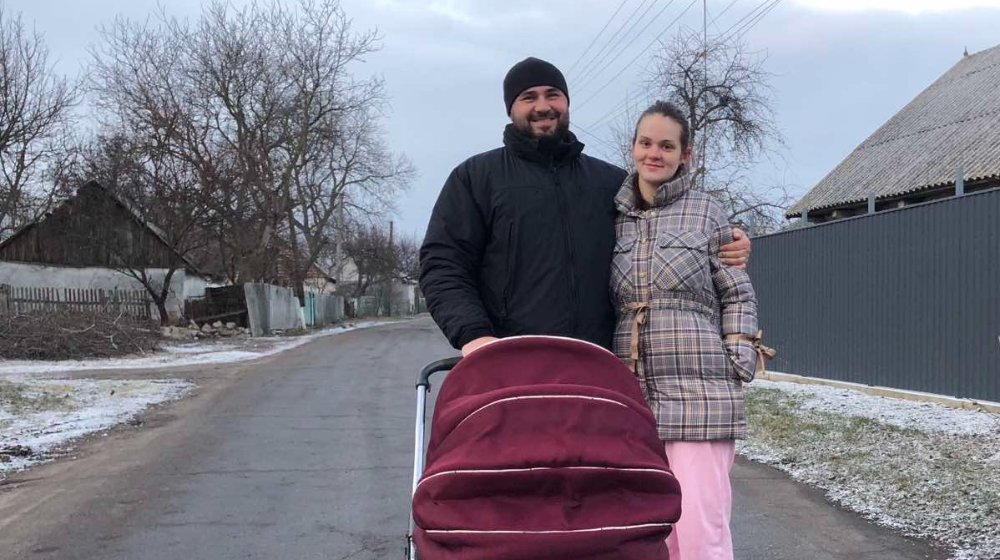News
After six months of war, physical and mental scars ravage generations across Ukraine
- 24 August 2022
News
KYIV, Ukraine – “He winces at sharp sounds, maybe as a consequence of the first days after his birth. Why should he have to go through this?”
At just 26 years old, Mariia had expected to be overwhelmed with the excitement of new motherhood. Instead, she is consumed with anxiety for her family’s future. Her son, Arthur, is now six months old, but has yet to live a day in peacetime: He was born in Kyiv on 25 February, the day after Russia launched its military offensive on Ukraine.
Instead of taking their newborn home wrapped up safely in a bundle of soft blankets, the family spent the next four days in a bunker underneath the hospital. “I stayed in the basement even when there were no air raid sirens, because it was too hard to run up and down the stairs to the maternity ward,” Mariia told UNFPA.
It was a difficult birth, and she needed postnatal care after leaving the hospital. “I was worried about the suture from the Caesarean section. I couldn’t contact my doctor because we left Kyiv, and there were no other specialists nearby.”
From forced displacement, severe shortages of reproductive health care and the high risk of sexual violence, the war in Ukraine is having a disproportionate impact on women and girls. For thousands of pregnant women without access to essential services, childbirth is now fraught with added danger: Many hospitals are citing higher numbers of premature babies, health facilities are destroyed and damaged, and staff and supplies are running increasingly low.
Mothers and newborns fight for survival
Nataliia was four months pregnant when the war started. Despite the shelling, she decided to stay in the Kyiv region: It was where she had given birth to her three other children and was her haven. She told UNFPA, “We felt safe in our house, although our days were filled with sirens and nothing was like it used to be.”
Yet the family were too afraid to venture outside and the mounting pressures of daily life began to weigh on her. With her anxiety and stress levels soaring, Nataliia’s waters broke two months before her due date: Her son, Artem, was born later that day weighing just 1.6 kilograms.
“He was very ill, and so tiny. I couldn’t hold him because he was too fragile,” she said. Spending the first two weeks of his life in an incubator, he received critical care from staff at the Kyiv perinatal hospital, one of more than 30 facilities UNFPA has supported since the war began.
Although Nataliia is now home in Kyiv, Artem’s traumatic birth is all too fresh in her mind: “As a mother, there is nothing worse than going through long months of pregnancy, followed by painful labour, only to see your baby fighting for his life.”

Delivering under fire
The World Health Organization has reported more than 473 attacks on health facilities in Ukraine. Some 12 million people are currently estimated to need health assistance, while more than 15 million require protection support. UNFPA has so far reached more than 6 million people with sexual and reproductive health supplies and services since the war broke out, providing over 80 tonnes of equipment and medicine to fill critical gaps in 37 hospitals, helping ensure safe birth and emergency obstetric services.
With women and girls also at increased risk of sexual exploitation and violence during conflict and displacement, UNFPA is working with 27 facilities for survivors, including shelters, crisis rooms and daycare centres. Over 100 mobile health teams have been deployed across the country, offering psychosocial support even in the most hard-to-reach and conflict-ravaged areas.
A toll too heavy to bear
Like so many others trying to survive in desperately uncertain times, for Mariia there has been an inevitable toll on her mental and physical health. “Since the beginning of the war, my life has changed radically. Our family grew, but we had to leave home. We lost our income. I try to hold on, but anxiety follows me everywhere.”
Six months after Russia invaded Ukraine, death, destruction and devastation haunt the country’s streets. Some 6.6 million people are internally displaced and nearly 7 million are refugees in neighbouring countries – the vast majority of them women and children. More than 1,500 women and girls are reported to have been killed since the start of the war and over 1,200 injured – although the true number is expected to far exceed this.
As the country reaches a sobering milestone, UNFPA remains dedicated to protecting women and girls' health and well-being – and in some cases their very survival. Conflict should never strip women of their fundamental rights, including their right to give birth safely and with dignity, and to live free from violence and abuse.